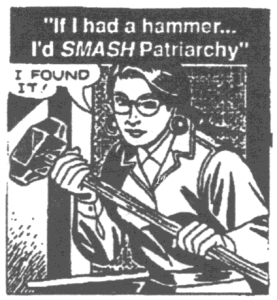
Feminism: Part 1
- Ruth Payne
- 7
- Posted on
 Feminism is badly communicated. That one little communication issue has let down every human who identifies as a feminist.
Feminism is badly communicated. That one little communication issue has let down every human who identifies as a feminist.
I have some pragmatic moderate-ness about this. There are groups and organisations and individuals out there talking about feminism and its goals in a positive and constructive way. The thing is, if those discussions were truly successful, I – we – wouldn’t get that reaction when ‘admitting’ to being a feminist.
This is partly a mainstream media thing. The 6 o’clock news, for example, needs to explain things to its audience in a few seconds. That’s why protests and shouting and anger feature on the news rather than intelligent people making rational arguments.
Those negative images are why the occasional positive stories about things that aim to help women/girls in first/third-world nations advance in technology/sport/farming/education are presented without reference to feminism, even if the organisation sponsoring those efforts is deeply feminist. I get that – if they were to mention feminism, those strong negative images of anger and combativeness trump positive images easily.
It’s not exactly the same thing, but try image searching ‘feminism’. Most of the top results are of Rosie the Riveter showing us her guns. There are a few black and white shots of protests and there are some slogans. Many (but not all) of the slogans and logos imply violence, which obviously is designed to confront and challenge.
The problem with these images, is that if you live in your bubble of patriarchal privilege and haven’t gone further than the mainstream media, it’d be fair to assume that feminists want to hurt you or your position in society. This applies to the women who abhor the idea of being called a feminist too – they don’t want to disrupt the society and way of life they know for some angry, probably ‘ugly’ and (shock! horror!) hairy unknown.
I am in no way saying ‘poor men, they’re too confronted by our fighting talk’. What I am saying is that we can’t expect any non-feminist – man or woman – to understand the completely reasonable principles of feminism given the images they’ve been exposed to. Surely the logical end game for feminism is equality of choice for all, so we need to really engage those people. We can’t and shouldn’t be happy with continuing a discussion at cross purposes where we yell our frustration and they laugh and deride our arguments.
There is place for challenge. There is place for protest. There is a place for a number of strategies to make a feminist world a reality. What I am suggesting is that we need to go back to the drawing board and get the basics right because right now, feminism is failing.





This is such a timely piece of writing for me as I’ve been thinking a lot lately about the way feminism seems to be losing ground. It’s brought home to me when my 10-year-old daughter complains that (in the 21st century!) she has to watch the same 4 movies from the DVD store over and over again because they’re the only ones with wonderful female heroes that she loves … and when I notice the kind of images of women that my teenage son is bombarded with daily when he checks the internet. I have a lot of faith in my son and think that if any teenage boy can get through these years without internalising some of those perceptions, it’s him … But can any??
I know what you mean about media images – sometimes it is hard to reconcile them with the real world.
What I do feel sure of is that as long as kids are taught critical thinking, they can disentangle the real from the skewed ‘ideal’. The fact that your daughter is aware of the construction of female heroes is a whole BUNCH ahead of me when I was ten – all I knew was a complete obsession with Madonna in all her problematic glory!
http://www.singularity2050.com/2010/01/the-misandry-bubble.html/
I’m interested to hear what your point is in posting this link. It seems to be antithetical to what I’m saying above but is a bit unintelligible. Some conversation/context would be great.
A link-only argument deserves a link-only rebuttal. Here’s some basic fact-checking on that link:
http://www.villainouscompany.com/vcblog/archives/2010/01/fact_checking_t.html
So true. When my friends and I were talking feminism back in the day, we were also concerned with freeing men from some societal restraints. We envisioned a world where men could cry, be full time caretakers of their children without prejudice, not be confined by male-only occupational status, but by their family and community relationships as well.
Seems like these constraints were fairly lifted for men: mr. mom, male nurses and flight attendants, etc. And yet, no credit is given…
Interesting. It’s true that men have more of those kinds of options now – and it’s certainly good, though perhaps a little thankless given the power dynamic still hasn’t really swung significantly into the neutral.
The pragmatic part of me says that the more ’emancipated’ men there are, the more likely we’ll be able to get closer to equality.